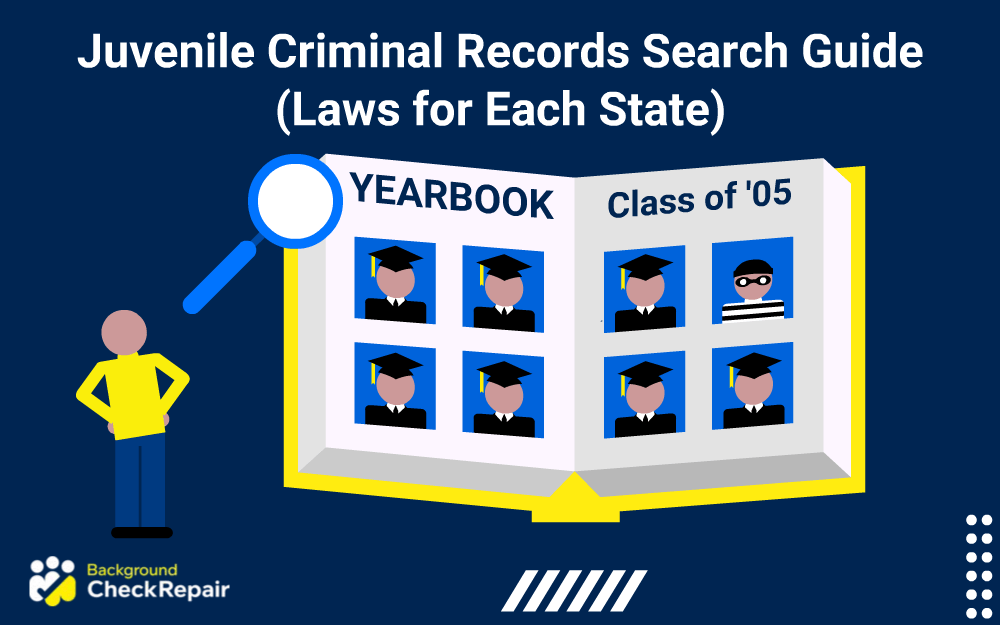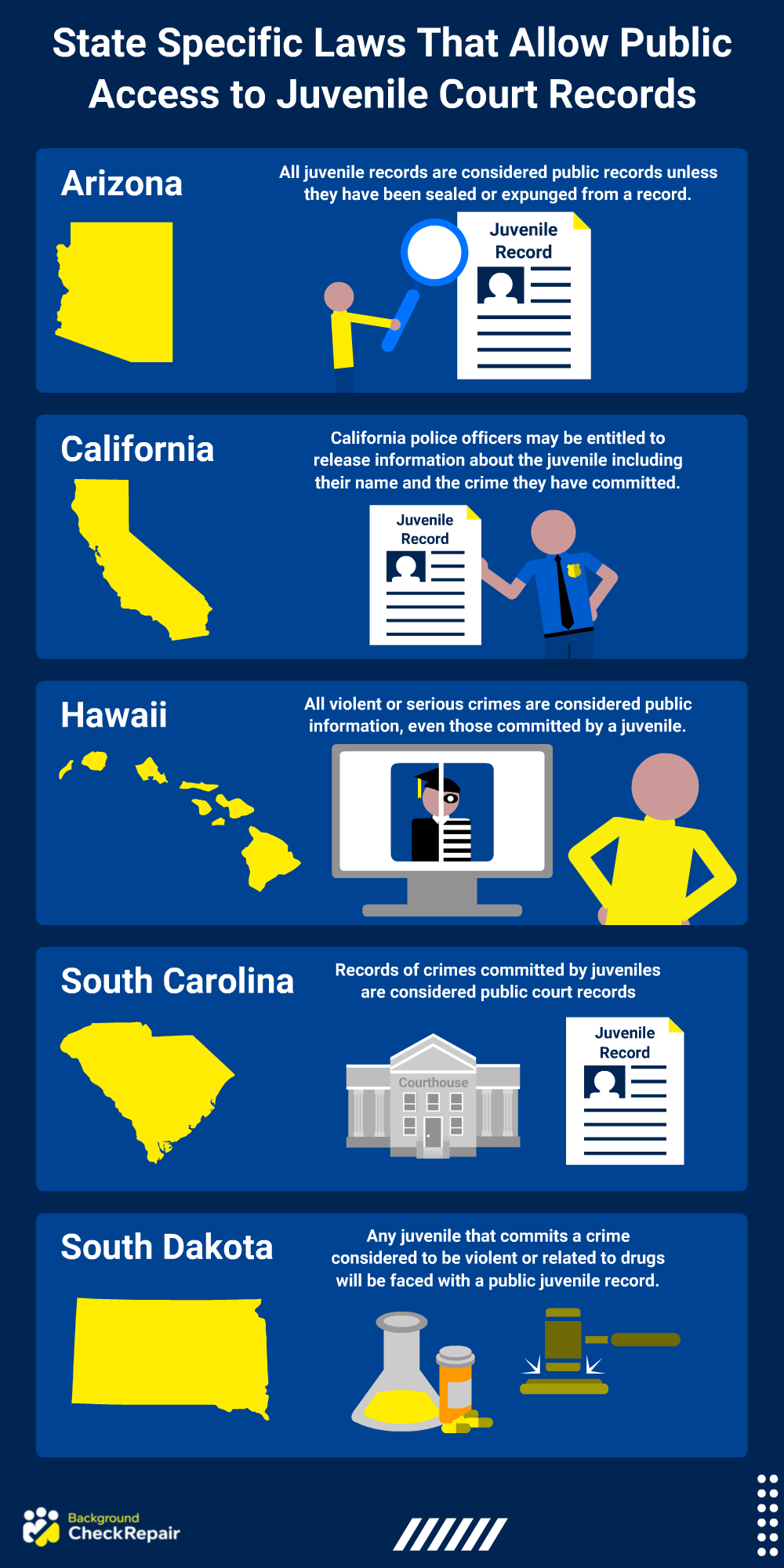We use cookies to ensure that we give you the best experience on our website. If you continue to use this site we will assume that you are happy with it
Juvenile Criminal Records Search Guide (Laws to Search Each State)
 Written by Background Check Repair
Written by Background Check Repair
Criminal Records | June 17, 2024

Table of Contents
From personal curiosity or a concern for your own safety, there are many reasons why you would want to conduct a juvenile criminal records search. Whether you are looking for yourself or checking on another person, you may be interested in the different ways to get information in various states.
The ability to get those records will rely heavily on who you are. In most states, information about a crime committed by a youth can be hard to access unless the searcher has a direct relationship to the minor in question. However, there are exceptions, and some states offer more leniency in the type of information they consider public information, often this access is related to the severity or type of crime on a record.
Knowing the laws for each state can assist your juvenile criminal records search, eliminating some of the guesswork.
What Are Juvenile Conviction Records?
A juvenile conviction record typically occurs after a crime has been committed by someone under the age of 18. There are some states that classify a juvenile, or child, by a different age. For example, Georgia considers a juvenile crime one that has been committed by someone under the age of 17.4 After a juvenile has been convicted of a crime, it shows up on a conviction record.
Juvenile records often consist of information about the crime that was committed, any punishment (like jail time or probation), and forms of rehabilitation that were assigned. Juvenile criminal records will still be present even if the child doesn’t get convicted of a crime.
In most cases, states will limit the information about juvenile records that can be found by the public. Despite popular belief, not all states consider crimes committed by a minor to be private information. There are some states that have passed laws that allow information to be shared and searched by the general public, especially if safety is a concern.
How to Search Juvenile Crime Records in Each State
The tools available for a juvenile criminal records search vary by state. Most states offer a free online search tool that will return public juvenile records, while others require a mailed document request. Most mailed requests have costs associated with receiving the legal details. Keep in mind this qualifies as a basic background check only.

Both options will typically only return juvenile records that have been made a public record. It’s important to understand that a public records criminal search may not return any legal information. If this is the case, it doesn’t mean that there isn’t a criminal history. It simply means that the history isn’t public. Using the links listed below, it may be possible to locate juvenile justice records by searching in each of the 50 states.
Do Criminal Conviction Records for a Juvenile Show Up on a Background Check?
Because a juvenile criminal record is still considered a criminal record, it may show up on a background check that records juvenile court history. Juvenile criminal history comes back on certain types of background checks, including some pre-employment checks. Many states have a policy that expunges a minor’s criminal history once they turn 18. When a record is expunged, it is wiped off of the record completely. If this is the case, the record won’t show up on a background check. Not all states offer this option, so it is important to confirm the laws before assuming.

The severity of the crime will also play a part into whether or not it is displayed on an individual background check. A severe crime like sexual assault or murder will be less likely to be expunged or removed from a juvenile’s criminal conviction records, especially if multiple severe crimes were committed.
It’s important to know how far back background investigations go on juvenile records. The seven year rule set aside by the Fair Credit Reporting Act will also make an impact on whether or not a criminal record criminal history shows up on a background check. In most states, the seven year rule says that arrests that don’t result in a conviction that are more than seven years old can’t be shown on background checks or used in employment decisions. If you are concerned that a juvenile record will show up on your background check, the best thing to do is learn conducting your own background check. Running your own background check can provide useful information about a criminal record.
Is a Juvenile Record Public Information? Who Has Access to Crimes on Juvenile Justice Records?
Most juvenile records found on a juvenile criminal records search are not considered public information. When a minor has a criminal record, it is usually sealed by the juvenile court. This means that it can’t be accessed by members of the public and, in some cases, isn’t available to law enforcement or government officials. There are some unique cases that make a juvenile conviction a piece of public information, including violent crimes and serious offenses (like a sex crime).1 The types of crimes that cause a juvenile record to become public vary based on specific states. Most states consider severe felonies like murder to be enough cause to make a juvenile record public.
In most states, there is a short list of people who have legal access to juvenile criminal records. The list typically includes the minor, the minor’s parents, and a hired attorney (if they have one). Depending on the state, juvenile records may also be available to child protective services, law enforcement (like juvenile probation officers), school officials, and federal or state attorneys.2 There are some states that require a court order before releasing any information on a juvenile criminal records search to individuals, even those featured on the list above.
Are There State Specific Laws That Allow Public Access to Juvenile Court Records and Crime Information?
Information found through a juvenile criminal records search is only available to the offender or someone with a direct responsibility for them. This can include a parent, guardian, or a hired attorney. Law enforcement officials also have access to court records juvenile. There are some states, however, that don’t hide all of a juvenile’s criminal history from the public, and will allow a juvenile case file to be available to the public if it is severe enough.

- Arizona: In Arizona, all juvenile records are considered public records unless they have been sealed or expunged from a record. This was done through an amendment to the Arizona Constitution in 1996.3 The amendment sought out to provide transparency to the citizens of Arizona who were concerned about safety and had the desire to learn about any arrest or conviction.
- California: As a state, California gives more freedom to law enforcement when it comes to sharing information about juvenile crimes. This mostly relates to the process of investigating a crime or providing public information releases. Depending on the severity of the crime, California officers may be entitled to release information about the juvenile including their name and the crime they have committed.
- Hawaii: Hawaii has a law instated that makes all crimes considered to be violent or serious public information, even those committed by a juvenile. This law is also true for any juvenile delinquency, or repeat crime, committed by a minor.
- South Carolina: In the state of South Carolina, only some records of crimes committed by juveniles are considered public court records. These include violent crimes, distribution of drugs, stealing a car, or committing a crime with a deadly weapon.
- South Dakota: Any juvenile that commits a crime considered to be violent or related to drugs will be faced with a public juvenile record in a South Dakota court. This law only applies if the minor is over the age of 16 at the time of the case.
Whether you are looking to access juvenile criminal history on yourself or someone else, it can be useful to know the laws and guidelines surrounding a search in each state. For specific details about states and the department that records criminal records and case information, you should always double check the state’s government website. Help can also be obtained through an attorney. You may want to consider learning the details included in a criminal record in your state.
Understanding the type of records that are available to the public will greatly help you in the process of completing your search. Some items will be more difficult to get than others, which will probably have an impact on whether or not you move forward with a search. If the information regarding a juvenile’s criminal history is important but hidden from the public, you may have the option of submitting a court order to gain access to it. This process typically involves legal proceedings and fees, which should be prepared for accordingly.
Armed with the techniques to complete a legal juvenile criminal records search, you should be able to access all information that is available to the public.
References
1Justia. Oct 2021. Confidentiality of Juvenile Court Records. 28 Nov 2021. Web. <https://www.justia.com/criminal/offenses/other-crimes/juvenile-crimes/confidentiality-of-juvenile-court-records/>
2NOLO. n.d. Exceptions to Confidentiality of Juvenile Criminal Records. 28 Nov 2021. Web. <https://www.nolo.com/legal-encyclopedia/exceptions-confidentiality-juvenile-criminal-records.html>
3Furbish, Lawrence. 18 Feb 1998. OLR Research Report. Connecticut General Assembly. 28 Nov 2021. Web. <https://www.cga.ct.gov/PS98/rpt%5Colr%5Chtm/98-R-0153.htm>
4Interstate Commission for Juveniles. n.d. Age Matrix. 30 Nov 2021. Web. <https://www.juvenilecompact.org/age-matrix>
